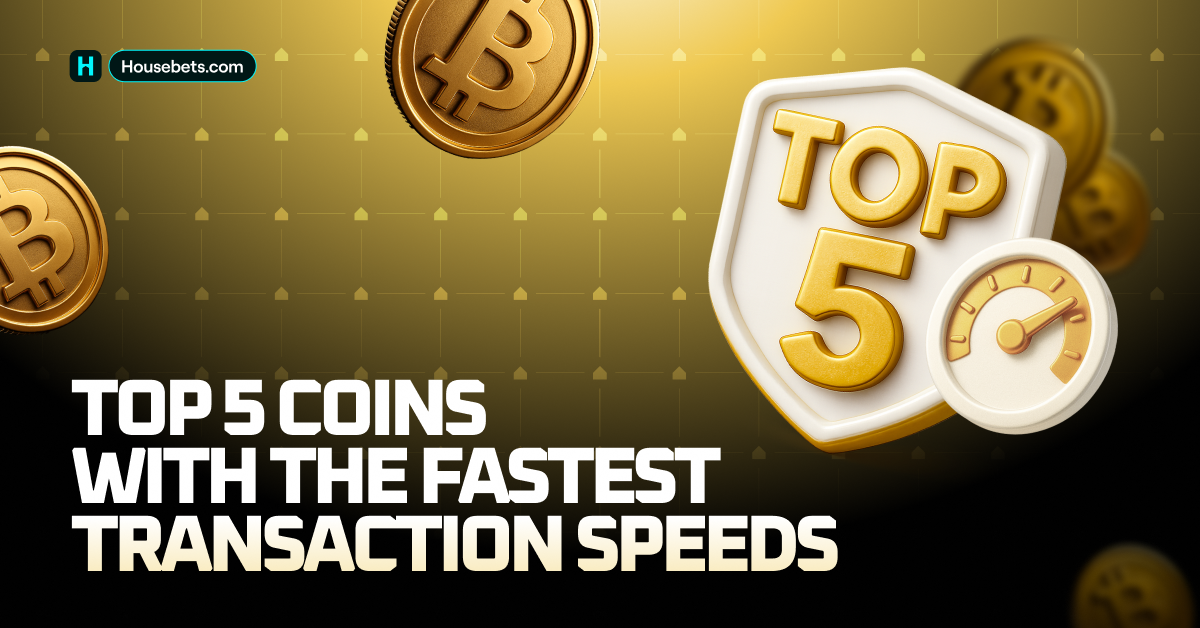Top 5 coins with the fastest transaction speed
Since the advent of Bitcoin over 15 years ago, many other cryptocurrencies have emerged, leading to a crucial question: Which one is the fastest?

Since the advent of Bitcoin over 15 years ago, many other cryptocurrencies have emerged, leading to a crucial question: Which one is the fastest?
In the ever-evolving cryptocurrency industry, speed is one of the key factors that all traders consider in a transaction.
In fact, one of the biggest reasons why digital currencies are now more popular than ever is that it is faster than your traditional currency, which we all know as fiat money.
We can also see the shift in the betting industry, as crypto-powered casinos like Housebets are now the go-to place for casino players and sportsbook bettors.
This is because, unlike traditional casinos that rely on fiat currencies, crypto-casino websites take advantage of blockchain technology to offer a more secure, speedy and transparent gaming experience.
Because of the decentralised process of cryptocurrencies, deposits and withdrawals are conducted in no time at online casinos like Housebets.
Unlike fiat currency transactions, where your funds go through a central authority, a financial institution, before you can withdraw, there are no such issues in a crypto transaction, as your fund is sent to you without the involvement of a mediator.
This makes the betting experience seamless and faster, which is why speed is a major factor in cryptocurrency transactions.
However, while all cryptocurrency transactions are fast, some coins have faster transaction speeds than others. As a result, we want to examine the top five crypto coins with the fastest transaction speed in this piece.
But before we look at the top five, let us look at some of the factors that affect the transaction speed of a coin.
Network Load- if the network load is higher, it affects the transaction speed of the cryptocurrency.
Transaction Complexity- If the transaction is a bit complicated, it affects the transaction speed.
Now that we have that, let us take a look at the top five coins with the fastest transaction speeds.
5 Coins with the fastest transaction speed
Stellar (XLM)
Created in 2014, Stellar was mainly launched to facilitate low-cost cross-border payments. It has a transaction speed of 3-5 seconds and a transaction capacity of 1,000 TPS. This makes Stellar’s speed faster than some of the biggest cryptocurrencies, including Bitcoin and Ethereum.
Stellar uses a tool called the Stellar Consensus Protocol (SCP) to achieve its high transaction speed.
Alvalanche (AVAX)
Avalanche is one of the next-generation coins that was launched in 2020. It has an average speed of less than 1-2 seconds and a transaction capacity of about 4,500 transactions per second (TPS).
Avalanche was built using a tool called Avalanche Consensus Protocol (ACP). One of its distinguishing features is that it can operate between different blockchain ecosystems.
Ripple (XRP)
Like Stellar, Ripple is also known for its low-cost border transactions. Launched in 2012 by Ripple Labs, Ripple has a transaction speed of less than 3-5 seconds and a transaction capacity of 1,500 TPS.
Ripple is seen as a bridge between cryptocurrency and fiat currencies because its network has a relationship with financial institutions, thereby facilitating transactions between different fiat currencies.
Algorand (ALGO)
Launched by Silvio Micali in 2019, Algorand was specifically created to support decentralised applications. It can process about 6000 transactions per second (TPS) and has an average transaction speed of less than 4.5 seconds.
It aims to be better than layer 1 blockchains and uses a pure proof-of-stake consensus algorithm that allows for high transaction throughput.
Solana (SOL)
Solana is one of the most popular coins, which is quite impressive, considering it was launched in 2020 by Solana Labs.
It has an average transaction speed of less than 0.4 seconds and can process a whopping 65,000 transactions per second. It uses a methodology known as Proof of History (PoH) and Proof of Stake (PoS) consensus to achieve its high transaction speed.
It also has impressive scalability, which makes it a power player in DeFi, NFTs, and high-volume applications.



